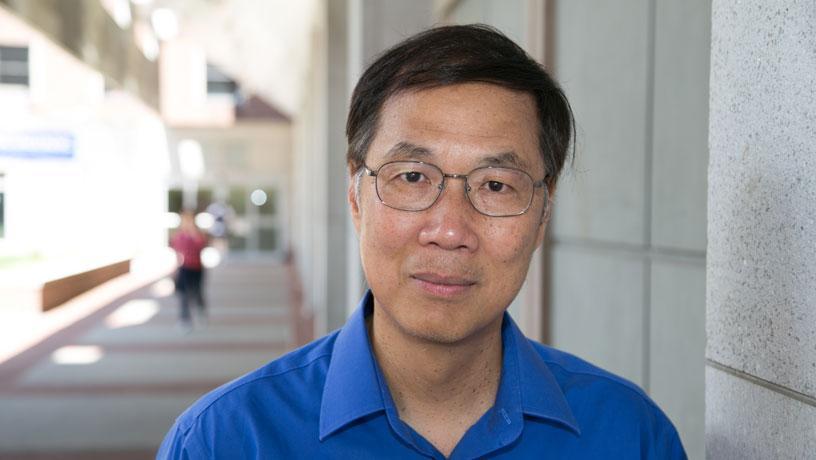Prof. Kam Leong Elected to the National Academy of Medicine

Kam Leong was honored for his contributions to biomaterials science and engineering, particularly in the areas of drug delivery, gene delivery, and cell topography interactions.
Kam Leong, the Samuel Y. Sheng Professor in the departments of biomedical engineering and systems biology, has been elected a member of the National Academy of Medicine (NAM), one of the highest honors in the fields of health and medicine. Election to the Academy recognizes individuals who have demonstrated outstanding professional achievement and commitment to service. The NAM cited his “contributions to biomaterials science and engineering, particularly in the areas of drug delivery, gene delivery, and cell topography interactions.”
“It is a tremendous honor to be recognized by my medical colleagues as an engineer,” says Leong, a leader at the forefront of drug and gene delivery as well as regenerative engineering. “My first thoughts were how fortunate I have been in working with such talented students and fellows all these years. I also have been blessed with wonderful collaborations with colleagues who inspired me to tackle important medical problems. Columbia offers such an intellectually stimulating and collaborative environment to research at the interface of engineering and medicine; this motivates me to work harder.”
Leong’s research focuses on the development of innovative biomaterials for three major therapeutic applications: in vivo gene editing, drug and gene delivery, and regenerative medicine. He uses polymeric biomaterials to deliver gene editing elements, chemotherapeutics, and cells for cancer therapy, immunotherapy, and inflammatory diseases. He also uses tissue engineering principles and stem cell engineering to construct human tissue-on-a-chip for disease modeling and drug screening.
“I am so pleased to see Kam recognized with this great honor with election to the National Academy of Medicine. His pioneering research advances engineering at the nano, molecular, cellular, and tissue scales, and brings these advancements to tackle major challenges in medicine. Kam’s work truly exemplifies the field of biomedical engineering and the aspirations of our school to bring engineering innovations to impact humanity,” said Mary C. Boyce, Dean of Columbia Engineering.
Biomedical Engineering Chair X. Edward Guo, Stanley Dicker Professor of Biomedical Engineering and professor of medical sciences, added, “On behalf of the Department, I would like to express our heartfelt congratulations to Kam. We could not be happier for him as he receives yet another distinguished recognition of his achievement and leadership. Kam is a fantastic colleague and we treasure his wisdom and humility.”
In cancer therapy, Leong collaborated with Dr. Tadao Ohno, former Director of RIKEN BRC Gene Bank in Japan, to develop a tumor vaccine comprising cytokines and tumor tissue fragments from the patients. It has been used to treat over 350 brain cancer patients in Japan. In nonviral gene therapy, Leong demonstrates the feasibility of using DNA nanoparticles to deliver therapeutic genes including the hemophilia and insulin genes through oral administration in animal models. He has also developed nanomanufacturing techniques to scale up the production of biomimetic and DNA nanoparticles, a critical barrier in the eventual translation of nanomedicine.
In regenerative medicine, Leong pioneers the application of DNA nanoparticles to convert adult cells from one cell type to another, raising the possibility of treating intractable neurodegenerative disorders via nonviral cell reprogramming. He has also recently developed nanoparticle-based gene editing technologies that can delete harmful genes and correct genetic disorders in vivo. The work will impact precision medicine and the development of human tissue-on-a-chip for new drug development.
Leong received a BS in chemical engineering from the University of California, Santa Barbara, and a PhD in chemical engineering from the University of Pennsylvania. He is a member of the National Academy of Engineering, National Academy of Inventors, and the Editor-in-Chief of Biomaterials.
He joins his Columbia Engineering colleagues Van C. Mow, Stanley Dicker Professor Emeritus of Biomedical Engineering and Professor Emeritus of Orthopaedic Engineering (elected 1998); Gordana Vunjak-Novakovic, University Professor and Mikati Foundation Professor of Biomedical Engineering (elected 2014); and Gerard Karsenty, Paul A. Marks M.D. Professor of Medicine and of Biomedical Engineering and Chair of the Department of Genetics and Development at CUIMC (elected 2014) in receiving this highly prized honor.
Established originally as the Institute of Medicine in 1970 by the National Academy of Sciences, the National Academy of Medicine addresses critical issues in health, science, medicine, and related policy and inspires positive actions across sectors. NAM works alongside the National Academy of Sciences and National Academy of Engineering to provide independent, objective analysis and advice to the nation and conduct other activities to solve complex problems and inform public policy decisions.
“I have known Kam for nearly 40 years, ever since he was a postdoc in my laboratory,” says Robert Langer, David H. Koch Institute Professor at MIT, and Leong’s former research colleague and mentor. “He has made enormous contributions to biomedical engineering and his inventions have saved and improved the lives of many people. Yet he is one of the nicest and most humble individuals I have ever met.”
I am so pleased to see Kam recognized with this great honor with election to the National Academy of Medicine. His pioneering research advances engineering at the nano, molecular, cellular, and tissue scales, and brings these advancements to tackle major challenges in medicine. Kam’s work truly exemplifies the field of biomedical engineering and the aspirations of our school to bring engineering innovations to impact humanity.
